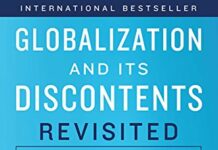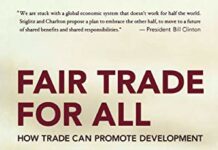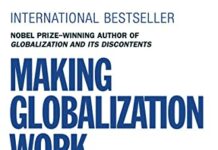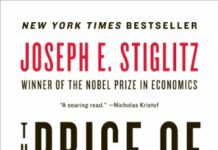
Ebook Info
- Published: 2014
- Number of pages: 680 pages
- Format: PDF
- File Size: 0.88 MB
- Authors: Joseph E. Stiglitz
Description
It has long been recognized that an improved standard of living results from advances in technology, not from the accumulation of capital. It has also become clear that what truly separates developed from less-developed countries is not just a gap in resources or output but a gap in knowledge. In fact, the pace at which developing countries grow is largely a function of the pace at which they close that gap. Thus, to understand how countries grow and develop, it is essential to know how they learn and become more productive and what government can do to promote learning. In Creating a Learning Society, Joseph E. Stiglitz and Bruce C. Greenwald cast light on the significance of this insight for economic theory and policy. Taking as a starting point Kenneth J. Arrow’s 1962 paper “Learning by Doing,” they explain why the production of knowledge differs from that of other goods and why market economies alone typically do not produce and transmit knowledge efficiently. Closing knowledge gaps and helping laggards learn are central to growth and development. But creating a learning society is equally crucial if we are to sustain improved living standards in advanced countries. Combining accessible prose with technical economic analysis, Stiglitz and Greenwald provide new models of “endogenous growth,” up-ending thowhe thinking about both domestic and global policy and trade regimes. They show well-designed government trade and industrial policies can help create a learning society, and how poorly designed intellectual property regimes can retard learning. They also explain how virtually every government policy has effects, both positive and negative, on learning, a fact that policymakers must recognize. They demonstrate why many standard policy prescriptions, especially those associated with “neoliberal” doctrines focusing on static resource allocations, have impeded learning. Among the provocative implications are that free trade may lead to stagnation whereas broad-based industrial protection and exchange rate interventions may bring benefits―not just to the industrial sector, but to the entire economy. The volume concludes with brief commentaries from Philippe Aghion and Michael Woodford, as well as from Nobel Laureates Kenneth J. Arrow and Robert M. Solow.
User’s Reviews
Editorial Reviews: Review Profound and dazzling. In their new book, Joseph E. Stiglitz and Bruce C. Greenwald study the human wish to learn and our ability to learn and so uncover the processes that relate the institutions we devise and the accompanying processes that drive the production, dissemination, and use of knowledge. The authors’ analysis provides the foundations of an understanding of the progress and regress of nations. This is social science at its best. — Partha Dasgupta, University of CambridgeAn impressive tour de force, from the theory of the firm all the way to long-term development, guided by the focus on knowledge and learning. Indeed, when economic theory takes knowledge on board―with its specific features and modes of accumulation―many of the conventional conclusions break down, from the welfare properties of competitive markets to the virtues of ‘comparative advantages’ in international exchanges. At the same time, in learning economies, public policies and institutions are shown to play a paramount role. This is an ambitious book with far-reaching policy implications. — Giovanni Dosi, Director, Institute of Economics, Scuola Superiore Sant’AnnaIf one’s attention is on the economic long run and the processes involved in economic change, innovation and learning quickly can be seen as occupying the center of the stage. Unfortunately, for the last half century, the bulk of the attention in microeconomic theorizing has been on economic statics, which is blind to these variables. This book is a welcome exception. — Richard R. Nelson, Columbia UniversityJoseph E. Stiglitz and Bruce C. Greenwald have contributed a superb new understanding of the dynamic economy as a learning society, one that goes well beyond the usual treatment of education, training, and R&D. This important work continues the quest of Stiglitz and Greenwald for an appreciation of the role of public policy in overcoming market failures, asymmetries, and inefficiencies, and it provides insights on the limits and distortions of laissez-faire assumptions of optimality. This book should be at the very center of the next wave of policy debate. — Robert Kuttner, coeditor, The American Prospect[A] sweeping work of macroeconomic theory. — Walter Frick ― Harvard Business Review About the Author Joseph E. Stiglitz is University Professor at Columbia University and a member and former chair of Columbia University’s Committee on Global Thought. He was the winner of the 2001 Nobel Prize for Economics. He served on President Clinton’s Council of Economic Advisors, and then joined the World Bank as chief economist and senior vice president. His most recent book is The Price of Inequality: How Today’s Divided Society Endangers Our Future.Bruce C. Greenwald is Robert Heilbrunn Professor of Finance and Asset Management at Columbia Business School. He is director of the Heilbrunn Center for Graham and Dodd Investing. His books include Value Investing: From Graham to Buffett and Beyond and Competition Demystified: A Radically Simplified Approach to Business Strategy Portfolio.
Reviews from Amazon users which were colected at the time this book was published on the website:
⭐Since a few years – having read some of his books – I respect Joseph E. Stiglitz. His new book, „Creating a Learning Society”,written Jointly with Bruce C. Greenwald now surprised me a little: it’s full of mathematical proofs. I found it unnecessarily difficult. I can recommend it only to readers who have adequate knowledge of mathematics.The book of course is still remarkable, since provides scientific treaty of fundamental questions of the issue. I draw the attention of the authors to the fact, that a lot is preached about the knowledge-based society in the former socialist – now neocapitalist – countries of Europe, though in fact a number of them, including Hungary are primarily engaged in diametrically opposite practices. They should include in the next edition of the book a separate chapter devoted to the „learning processes” in those countries.
⭐Stiglitz is a big author in the context of the modern research in economics. We see this approach which is correlated to facts about particularly the asymmetric information. He explicates the concepts of the last crisis making us sure that the recovery is already present and real. But what that allows to understand the strong preparation of Stiglitz is the ability in mathematics. Half part of the book contains rich examples about real models, and the solution is made ease for the sensibility of the author for an efficient use of the mathematics, particularly the game theory. So the same game theory reveals itself as important for those types of problem.
⭐I highly recommend this book.Prior to reading I would ask the readers hone up by reading the east Asia miracle(a world bank paper/book which is free online in pdf form)This book exposes international institutions and their ideology.Another book that reveals the ideology of IMF/World bank,EU is Ha joon chang “kicking away the ladder”For a practical application of the theory in this book read “learning to industrialize” by Sanjaya Lall
⭐Pure, distilled Stiglitz. To read it is to apprehend a world view of human economics (which he espouses) and also a world view that you, I or anyone could espouse to make your, my or anyone’s world a better place to live, for all of us and for generations to come. Slow reading sometimes. I found myself having to “digest” rather than “read.” Complex ideas in complicated sentences. Pure, distilled Stiglitz, not to be diluted but rather to be mulled over.
⭐good book
⭐We know education is indispensable for progress…but how to achieve it in a macro level? Reading this will entertain your thoughts on the matter, particularly if you are an economist since it can ve a technical read.
⭐This is a heavy academic work – and a good one. I especially like the view that IP rights in the US are constraining creativity.
⭐Much easier to navigate-for students as well as practitioners-then the previous larger version…Excellent overview and macro perspective on the necessity of learning and knowledge acquisition for organization and country success
⭐So far have found plenty about efficiency but not much about effectiveness from the point of view of real world Sustainabilty, renewable energy, acres per person etc.
⭐Useful book with good structure.Most of chapters was well built and easy enough to understandI wish a lot of people read this book
⭐Great read, recommended.
⭐pretty heavy going in bits but excellent analysis
⭐Great book!
Keywords
Free Download Creating a Learning Society: A New Approach to Growth, Development, and Social Progress (Kenneth J. Arrow Lecture Series) in PDF format
Creating a Learning Society: A New Approach to Growth, Development, and Social Progress (Kenneth J. Arrow Lecture Series) PDF Free Download
Download Creating a Learning Society: A New Approach to Growth, Development, and Social Progress (Kenneth J. Arrow Lecture Series) 2014 PDF Free
Creating a Learning Society: A New Approach to Growth, Development, and Social Progress (Kenneth J. Arrow Lecture Series) 2014 PDF Free Download
Download Creating a Learning Society: A New Approach to Growth, Development, and Social Progress (Kenneth J. Arrow Lecture Series) PDF
Free Download Ebook Creating a Learning Society: A New Approach to Growth, Development, and Social Progress (Kenneth J. Arrow Lecture Series)





